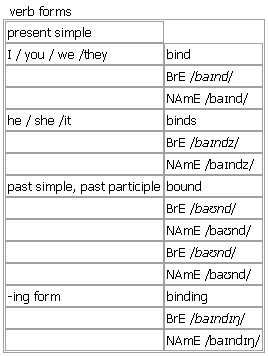 bind
bind

bind [bind binds bound binding] verb, noun BrE [baɪnd] NAmE [baɪnd]
verb (bound, boundBrE [baʊnd] ; NAmE [baʊnd] )
TIE WITH ROPE/CLOTH
1. transitive (formal)to tie sb/sth with rope, string, etc. so that they cannot move or are held together firmly
•~ sb/sth to sth She was bound to a chair.
•~ sb/sth together They bound his hands together.
•~ sb/sth He was left bound and gagged (= tied up and with a piece of cloth tied over his mouth).
2. transitive ~ sth (up) (formal)to tie a long thin piece of cloth around sth
•She bound up his wounds.
UNITE
3. transitive to unite people, organizations, etc. so that they live or work together more happily or effectively
•~ A (and B) (together) Organizations such as schools and clubs bind a community together.
•~ A to B She thought that having his child would bind him to her forever.
MAKE SB DO STH
4. transitive, usually passive to force sb to do sth by making them promise to do it or by making it their duty to do it
•~ sb (to sth) He had been bound to secrecy (= made to promise not to tell people about sth).
•~ sb to do sth The agreement binds her to repay the debt within six months.
see also ↑binding, ↑bound
STICK TOGETHER
5. intransitive, transitive to stick together or to make things stick together in a solid mass
•~ (together) Add an egg yolk to make the mixture bind.
•~ sth (together) Add an egg yolk to bind the mixture together.
BOOK
6. transitive, usually passive ~ sth (in sth) to fasten the pages of a book together and put them inside a cover
•two volumes bound in leather
SEW EDGE
7. transitive, often passive ~ sth (with sth) to sew a piece of material to the edge of sth to decorate it or to make it stronger
•The blankets were bound with satin.
see bind/tie sb hand and foot at ↑hand n.
Verb forms: 
Word Origin:
Old English bindan, of Germanic origin; related to Dutch and German binden, from an Indo-European root shared by Sanskrit bandh.
Example Bank:
•She found herself bound hand and foot.
•The sails are bound to the mast with cord.
•They bound his hands together tightly.
•He was left bound and gagged.
•Their hands were bound with ropes before they were led away.
Idiom: ↑in a bind
Derived: ↑bind somebody over
noun singular (BrE, informal)
an annoying situation that is often difficult to avoid
see also ↑double bind
Word Origin:
Old English bindan, of Germanic origin; related to Dutch and German binden, from an Indo-European root shared by Sanskrit bandh.
|
|
